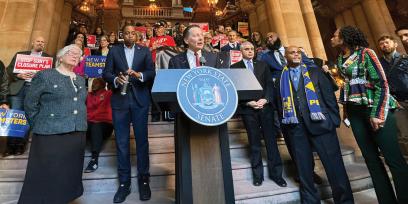The focal point for our Code Red campaign is the State University of New York (SUNY) Downstate Medical Center, which is a public medical school and hospital in central Brooklyn. One of three SUNY teaching hospitals, it’s located in a community that is predominantly African American, with large Caribbean and Latinx immigrant populations. This community is under-resourced and has many economic and healthcare challenges.
Downstate is one of seven very financially stressed healthcare institutions in the area. Since 2011, it has faced multiple financial challenges and threats of closure—most notably by former governor Andrew Cuomo, who tried to forcibly close the institution by cutting off all state funding. With the incredible support of AFT President Randi Weingarten, we were able to fight off the worst of those challenges. But now, SUNY has determined it no longer wants to be “in the hospital business.” Working with our current governor, Kathy Hochul, SUNY plans to close the hospital to build affordable housing, maintaining the medical school but parceling out hospital services to other institutions, including Kings County Hospital Center across the street.
This proposal has disastrous implications. It will result in the greatest harm to patients in central Brooklyn, who are least able to pay for healthcare and have high incidences of severe chronic conditions such as diabetes and hypertension.1 This community also has a severe maternal morbidity rate, higher than anywhere else in the state.2 The quality of patient care at all seven central Brooklyn hospitals has already suffered because of the financial challenges of the last several years. Patients who can afford healthcare routinely go elsewhere, often to Manhattan. Patients without means may not seek care at all. Wait times at Kings County are already so long that patients have left, their IV lines and poles still attached, to seek care at Downstate’s ER. Without Downstate, what will these patients do?
This proposal also harms our Downstate members. By SUNY’s own calculation, it will impact 10 to 20 percent of members and send 2,400 employees to a single wing of Kings County, which is in even worse financial shape. Where will that leave our members?
And closing Downstate while keeping the medical school open will greatly harm the medical school and the quality of future healthcare for the community. Area hospitals are so desperate for funds that they’re accepting money from offshore medical schools to place their residents—meaning fewer slots available for local residents and interns who need to continue their training. SUNY Downstate’s medical school has one of the largest, most diverse graduating classes in the state, with physicians who overwhelmingly choose to serve equally diverse communities in New York. New York should be investing in the hospital, not making it harder for future doctors to complete their education.
So, our immediate priority is stopping the closure. We began with getting our story out to the public with a very clear message: Brooklyn needs Downstate. We’re posting testimonials from Downstate doctors, nurses, and administrators on our website with our campaign message and press releases. We’re launching a visibility campaign with television, radio, and social media spots, and providing posters, stickers, and T-shirts to be worn in solidarity. We’re asking members to write letters to the governor and using rallies, silent protests, and pickets to keep momentum going. We’ve already garnered strong support in the New York state legislature to stop this destructive plan.
We are strengthening our community coalition, reaching out to clergy members and other community leaders and groups. We’re talking with people directly about how this plan will impact them and their families. And we’re working with other unions, including New York State United Teachers, the Public Employees Federation, the New York State Nurses Association, and two AFSCME locals, to increase awareness and support.
Long term, we are aggressively advocating for a reimagined Downstate through a community- and stakeholder-driven process that is inclusive every step of the way. The result will be a world-class academic medical center that addresses the longstanding health disparities in Brooklyn. Downstate would then make a real difference to the maternal mortality crisis and the rates of chronic disease in this community and serve as a groundbreaking national example. To best serve the community, we are calling for a planning process that centers the central Brooklyn community and those engaged in the lifesaving work at Downstate.
This is a very passionate and personal issue—and a moral cause—for us. We remain hopeful that the governor’s office, the legislature, and all other stakeholders will join us in the important work of planning a sustainable future for Downstate that provides the access and care this community deserves.
Frederick E. Kowal, PhD, is the president of United University Professions (UUP), an AFT vice president, and a professor of political science and Native American studies at the State University of New York at Cobleskill. Carolyn Kube, MS, MT (ASCP), is UUP’s statewide vice president for professionals and was a medical technologist for 32 years at Stony Brook University Hospital.
Endnotes
1. Commission on the Public’s Health System, The Need for Caring in North and Central Brooklyn (New York: 2012), cphsnyc.org/cphs/reports/the_need_for_caring_in_north_and/CPHS_CHNA_report_12_6_12_final:en-us.pdf; and New York State Department of Health, Brooklyn Borough: Equity Health Report (New York: April 2021), health.ny.gov/statistics/community/minority/docs/mcd_reports_2021/kings_county_brooklyn_borough.pdf.
2. Office of Communications & Marketing, “U.S. Department of Health and Human Services Awards $439k Grant to SUNY Downstate to Support Black Maternal Health Intervention Study in Central Brooklyn,” Downstate Health Sciences University, November 29, 2022, www.downstate.edu/news-events/news/2022/11-29-2022.html; and New York City Department of Health and Mental Hygiene, “Maternal Mortality and Severe Maternal Morbidity in New York City,” April 2021, nyc.gov/assets/doh/downloads/pdf/data/maternal-mortality-annual-report-2020.pdf.
[Photo: AFT]

